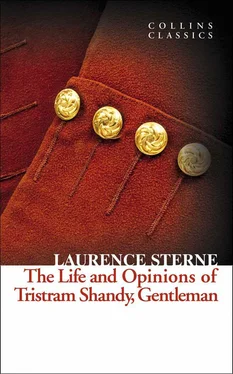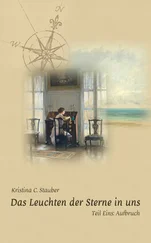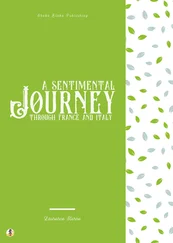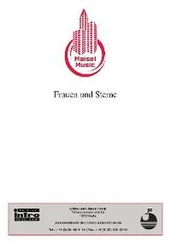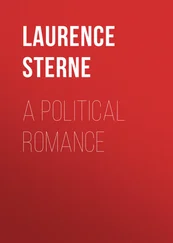An added complication comes when the reader does not necessarily understand that humour is the aim of the author. Bearing in mind that people would have been unfamiliar with the concept of the comic novel in general, Sterne had his work cut out, especially given that his particular genre of comedy was somewhat coarse and dark for the tastes of his era.
One of the most notable personalities in the book is that of the character Uncle Toby. He is particularly fond of regaling stories of a military nature by verbally and physically acting them out, much to the amusement of others. The narrating voice of Tristram describes these tales as his uncle’s ‘hobbyhorse’, which is a term he uses in general to describe the way different characters find their amusement in life.
The original frontispiece etching for Tristram Shandy , by William Hogarth, shows a character named Corporal Trim reading a sermon on the subject of conscience to a rather disinterested audience, preoccupied with smoking pipes and sleeping. In the foreground is a rotund figure ensconced in an armchair. He wears an 18th-century wig and attire, his tricorn hat fallen to the floor. This image is attributed as the model for the Toby Jug that Staffordshire potters began manufacturing in the 1760s. Although mistaken for Uncle Toby, the image is in fact of Dr Slop, while Uncle Toby actually sits with the narrator’s father Walter in the far corner of the room. Hogarth also illustrated Tristram’s baptism, following his birth, which doesn’t come until volume four of the book, such is the narrator’s tendency for logorrhea.
One of the most remarkable things about Sterne’s approach to writing is the way in which he used graphics to relay information to the reader. For example, there was an entirely black page following the demise of a character named Yorick, which acts as a psychological pause for thought and contemplation. He also uses entirely blank pages to encourage the reader to superimpose their own imagined visual image of the characters. There is also the use of peculiar punctuation, dashes and lines, which Sterne uses as expressive semiotic tools in his prose where he feels that words alone are insufficient. All in all, the effect is rather eccentric and disjointed. However, a century later this odd style would be exalted as the seminal avant-garde literary form.
About the Author
Sterne was the son of an English army officer and spent his early years moving wherever his father was stationed. At the age of 10, he was sent to school in Halifax, where he was introduced to Latin and Greek. In turn, he was able to read the Classics and so had a formal education in seminal literature, such as the works of Homer, which profoundly affected his sensibilities. He later studied at Cambridge for his first and second degrees.
Like many gentlemen academics of his era, Sterne was encouraged to enter the church and was ordained as a vicar at the age of 25. Life as a clergyman did not really suit Sterne’s temperament, and he also suffered from tuberculosis or consumption, which made his voice rather too weak for preaching to a congregation. Despite these drawbacks, he persisted with his ‘calling’.
He married at the age of 28 and became father to a daughter, Lydia, some six years later. A decade later, his wife, Elizabeth, suffered a breakdown when she learned that Sterne had had an affair with a maid. In addition, his health was failing and Lydia was a sickly child, so the household became rather unhappy.
It was at this time that Sterne turned to his pen, probably as much as a form as escapism as an attempt to fulfill a long-held literary ambition. He had met many colourful characters in his life and he possessed a keen intellect for satire, irony, cynicism, scepticism and rhetoric. This enabled him to populate Tristram Shandy with a cast of exaggerated personalities in a similar vein to Charles Dickens, who was born a century later.
Sterne finally succumbed to the tuberculosis infection that had dogged him his entire adult life. It is not entirely clear that he had finished Tristram Shandy , for he may well have added subsequent volumes had he lived on, and the format was certainly open-ended. Following his death, he did provide one more darkly comic installment: his body was exhumed by grave robbers and sold in Cambridge for an anatomy lecture, which was quite commonplace at the time. As he was a prominent figure, someone recognized his cadaver in the operating room and he was discreetly returned to his resting place. Sterne would surely have found this event rather amusing from his celestial vantage point, for it was just the kind of thing that he borrowed from in his work.

To the Right Honourable Mr. Pitt.
Sir,
Never poor Wight of a Dedicator had less hopes from his Dedication, than I have from this of mine; for it is written in a bye corner of the kingdom, and in a retir’d thatch’d house, where I live in a constant endeavour to fence against the infirmities of ill health, and other evils of life, by mirth; being firmly persuaded that every time a man smiles,—but much more so, when he laughs, it adds something to this Fragment of Life.
I humbly beg, Sir, that you will honour this book, by taking it—(not under your Protection,—it must protect itself, but)—into the country with you; where, if I am ever told, it has made you smile; or can conceive it has beguiled you of one moment’s pain—I shall think myself as happy as a minister of state;—perhaps much happier than any one (one only excepted) that I have read or heard of.
I am, Great Sir, (and, what is more to your Honour) I am, Good Sir, Your Well-wisher, and most humble Fellow-subject,
The Author.
VOLUME I
I wish either my father or my mother, or indeed both of them, as they were in duty both equally bound to it, had minded what they were about when they begot me; had they duly consider’d how much depended upon what they were then doing;—that not only the production of a rational Being was concerned in it, but that possibly the happy formation and temperature of his body, perhaps his genius and the very cast of his mind;—and, for aught they knew to the contrary, even the fortunes of his whole house might take their turn from the humours and dispositions which were then uppermost;—Had they duly weighed and considered all this, and proceeded accordingly,—I am verily persuaded I should have made a quite different figure in the world, from that in which the reader is likely to see me.—Believe me, good folks, this is not so inconsiderable a thing as many of you may think it;—you have all, I dare say, heard of the animal spirits, as how they are transfused from father to son, &c. &c.—and a great deal to that purpose:—Well, you may take my word, that nine parts in ten of a man’s sense or his nonsense, his successes and miscarriages in this world depend upon their motions and activity, and the different tracks and trains you put them into, so that when they are once set a-going, whether right or wrong, ’tis not a half-penny matter,—away they go cluttering like hey-go mad; and by treading the same steps over and over again, they presently make a road of it, as plain and as smooth as a garden-walk, which, when they are once used to, the Devil himself sometimes shall not be able to drive them off it.
Pray my Dear, quoth my mother, have you not forgot to wind up the clock?—Good G—! cried my father, making an exclamation, but taking care to moderate his voice at the same time,—Did ever woman, since the creation of the world, interrupt a man with such a silly question? Pray, what was your father saying?—Nothing.
Читать дальше
